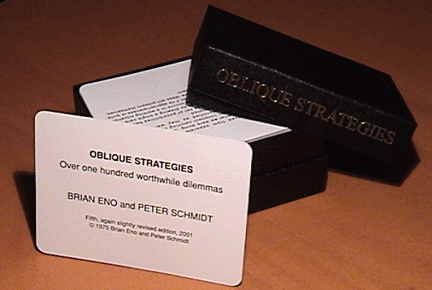
Have you ever sat in your writing space, studio, or creative place, trying to finish a project but battling writer's block? It happens to lots of people, from beginners to the absolute pros. You are percolating along and all of a sudden you can't figure what to do next. As a composer and producer I've found myself with a nearly completed song or project on the DAW with an impending delivery date (or time), knowing it needed something but sitting, staring at the screen, wondering what to do to finish it. Creativity is an interesting thing that can at times be at odds with time pressure. Sometimes it just needs a gentle kick in the butt.
Enter The Oblique Strategies, a rather unique creative tool created by producer and musician Brian Eno and his friend and painting teacher, Peter Schmidt. It is a pack of 100 cards, each with a short strategy or suggestion designed to help an artist break through either writer's block or a creative dilemma. The idea sprung from meetings between the two artists when they compared notes and realized they both produced under time pressure and often encountered either writer's block or creative dilemmas that ordinarily wouldn't be a problem to solve but became a problem in high-stress production environments. The two discovered that when they were under pressure, they had a tendency to go with the most straightforward solution, to work "within the box," which often wasn't the best solution. During lower-stress times they had independently begun journaling methods they used to approach those creative blocks when they weren't under pressure so that they could refer to them when they WERE under pressure. The idea was to help push them off the dime, to remind them that there are other mindsets to enter that could suggest alternate possibilites rather than the most straightforward one. At a meeting, they discovered how similarly they worked as they compared notes. Both had reduced their ideas to cards for easy access. Both had strategies that were more creative than technical. They suggested attitudes and ways of thinking to influence their actions and to encourage "lateral thinking.* " Eventually Eno suggested that they combine their strategies and put them out as a card set so that they could share the concept with artistic friends.
And so we have before us The Oblique Strategies. In application, Eno suggests that you can either shuffle the deck and pull out a card at random or riff through the pile until you find one that stimulates you. That's the point of the whole exercise. The results can be either useful or entertaining but they will definately provoke thought. Engineer Ronan Chris Murphy has suggested that the cards could also be used in those awkward situations where you have two band members at odds over the course for the next creative step. You've been there: tempers flair and people tend to retrench and become defensive. Something is needed to break the stalemate without threatening either party. Ronan suggests that you could have the two agree to abide by the suggestion of a randomly drawn card to bring them down off the cliff and begin to pursue a resolve. Besides anything else, the delightful randomness of the strategies coud lighten things up a bit.
It was 1975 when the first edition of 500 sets of one hundred cards was published, right about the time Brian Eno and Robert Fripp released their brilliant, ethereal Evening Star album featuring cover art by... wait for it... Peter Schmidt. The tool became an underground success amongst Eno's artistic acquainances and that success quietly spread abroad. We are now forty years and at least four more official editions down the road. Sets of the original cards can run you $1500 or more on eBay but Eno sells his latest set for £30.00 ($47.19) on his webshop. You can go the modern route and spend $0.99 to download an APP with all five editions from iTunes for IOS devices or from Amazon for the Android but the cards are somehow more cool.
You can find the latest card version at the ENO SHOP.
You can watch Ronan Chris Murphy's video on the subject here:
* More on lateral thinking HERE at Wikipedia.
=